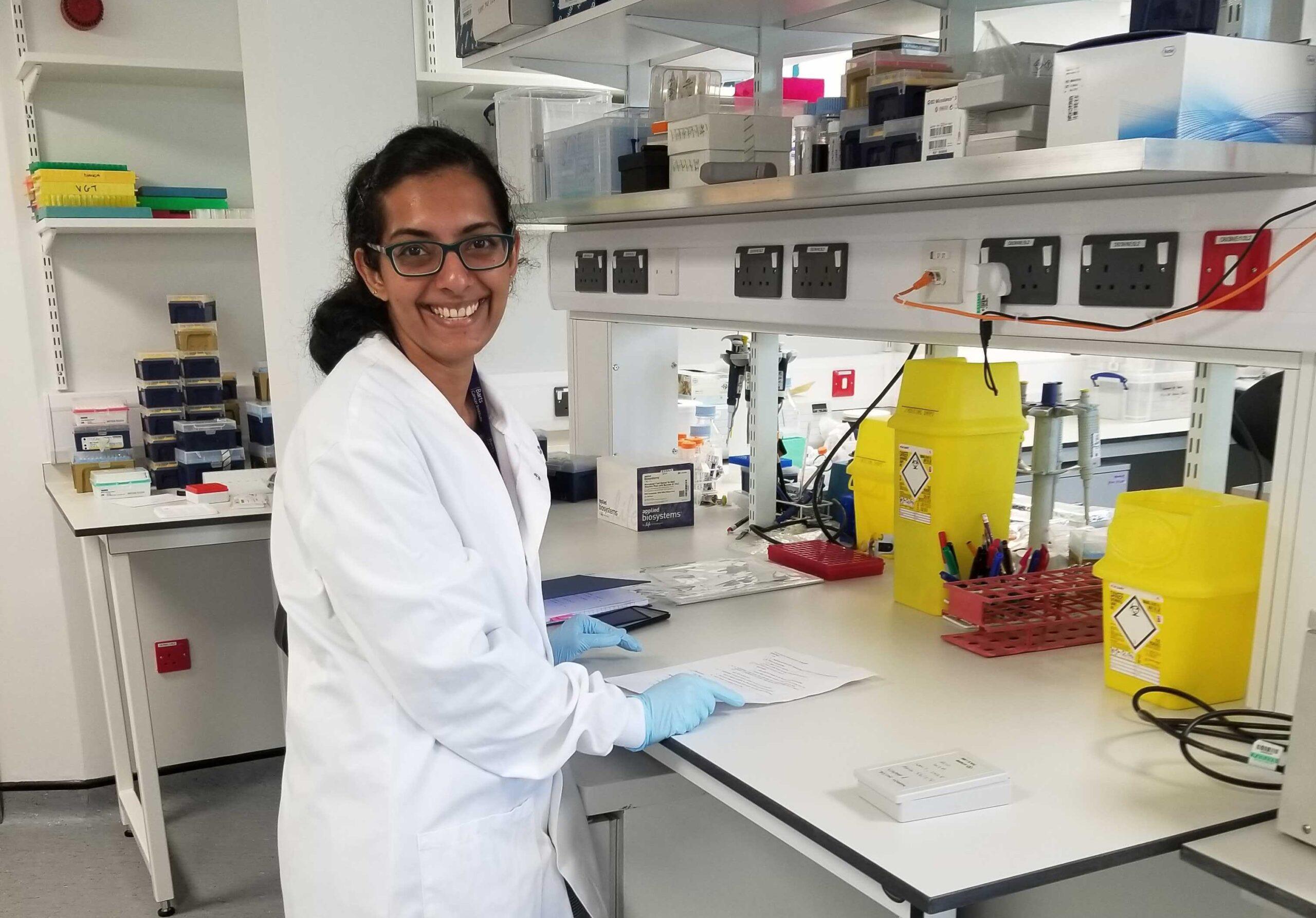Breaking down language barriers in cancer:
Making screening information more accessible
Vinaya Srirangam Nadhamuni, Clinical Research Fellow at Barts Cancer Institute (BCI), Queen Mary University of London, has been working on a project to make information about screening programmes more accessible to minority ethnic groups in the UK.

As a histopathology trainee, Vinaya completed 18 months of training in histopathology before pursuing a PhD as part of the Cancer Research UK (CRUK) City of London Centre Clinical Research Training Fellowship Programme. Vinaya is undertaking her research project in Professor Trevor Graham’s laboratory group in BCI’s Centre for Cancer Genomics and Computational Biology, which is looking at the immune microenvironment in bowel cancer.
After competing at the national final of the 2020 Vitae Three Minute Thesis® (3MT®) competition, Vinaya won the ‘People’s Choice Award’ and consequently received 1,000 pounds prize money to put towards a public engagement project.
Using the prize money, Vinaya has been leading on a project to translate two screening information videos (one on bowel cancer screening and one on cervical screening) into Sylheti (Bengali) and Urdu. The project fits within the remit of Queen Mary’s 2021-2026 strategy for its Faculty of Medicine & Dentistry, which aims to tackle and address health inequality to achieve better health for all.
We recently spoke with Vinaya to find out more about the project.
What motivated you to pursue this project?
Histopathologists play an important role in diagnosing cancers picked up by screening programmes. Consequently, I am aware of the importance of promoting uptake of such programmes and wanted the engagement activity supported by Vitae to focus on this.
While looking into initiatives previously used to promote screening, I found videos produced by CRUK explaining the process of screening to encourage people to participate in these programmes. I noted that many of these materials were primarily in English and wondered if they could be translated into more languages to improve their impact and the range of people who could benefit from them.
As screening programmes often involve procedures that people may find embarrassing (such as undergoing a cervical smear test or providing a stool sample), people with a language barrier may find it difficult to broach these subjects with their GP and discuss such topics in a language that they are not very confident in. Indeed, I came across an independent review of adult screening programmes in England from 2019, which found uptake of screening in many minority ethnic groups was significantly lower than the rest of the population, partly due to language barriers.
We are perhaps more aware than ever before of the health inequalities that persist for people of ethnic minorities. I wanted to focus on a project that would address this disparity in screening uptake in ethnic minority groups, especially in those affected by language barriers.
I felt that translating pre-existing videos on screening may help benefit groups who may otherwise not be reached through the English versions. I reviewed the national census data (2011) and identified Sylheti (Bengali) and Urdu as languages spoken by minority groups who may not speak English as well. I also identified bowel cancer screening and cervical screening as having procedures that some people may find particularly embarrassing, and consequently may not participate in.
How did you carry out the project? Who did you work with?
Working with the Community Engagement Manager at CRUK, we identified Stripe Media as the organisation that had previously worked with CRUK in producing the screening videos we wanted to translate. Stripe were able to coordinate with professional translation agencies and add translated subtitles and voiceovers to the videos.
Experts as well as members of the public, where possible, reviewed translations: I reached out to the language departments at the School of Oriental and African Studies (SOAS) University of London to assist with expert review. Professor Amina Yaqin (previously based at SOAS University of London and currently Associate Professor in World Literatures and Publishing at University of Exeter) reviewed translations in Urdu. Translations in Sylheti (Bengali) were reviewed with input from the Sylheti Project (SOAS University of London).
I also obtained advice from Professor Stephen Duffy, Professor of Cancer Screening at Queen Mary’s Wolfson Institute of Population Health, who recommended working with the British Islamic Medical Association (BIMA), which has previously led campaigns promoting cancer screening to the British Muslim community. The BIMA was instrumental in facilitating review in Sylheti (Bengali) and Urdu through a network of its members who are proficient in these languages. The BIMA is also aiming to disseminate the videos to the target groups of interest, by promoting via their local community outreach contacts. Similarly, I have been working with the Public Engagement Team at Queen Mary to disseminate the videos to anyone in the local community around Queen Mary who may be proficient in Sylheti (Bengali) and/ or Urdu and benefit from these materials.
UKRI funding was awarded to me from winning the People’s Choice prize at the Vitae 3MT® competition 2020, which was used for the video translation. Additional funding support was also available from Professor Graham's laboratory (the Evolution and Cancer laboratory) and the BCI, which was used to facilitate translation of feedback forms to allow us to gather feedback from the target groups.
What do you hope the impact of this project will be?
We hope that participants who engage with the project will learn if they are eligible for bowel cancer screening or cervical screening. I hope that viewing the videos will demystify the screening process and give viewers more confidence to participate in screening.
Eventually, we hope that engaging with the project encourages people to have the conversation about screening procedures they might otherwise find embarrassing with their loved ones and/or GP and participate in screening programmes, thereby increasing the number of cervical cancers we can prevent and the number of bowel cancers we can catch in the early stages.
The translated videos are available to watch below.
Category: Engagement, General News

No comments yet